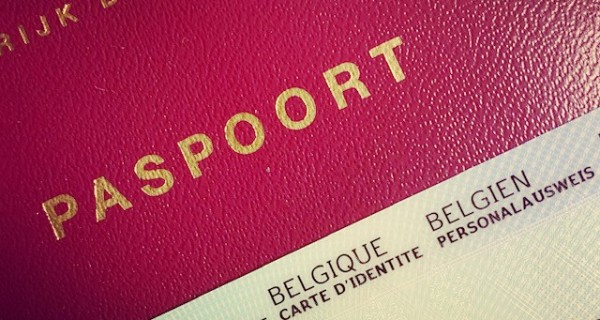Dutch passport vs. Belgian passport: a comparative analysis

The connection between the Netherlands and Belgium goes beyond sharing a border. Approximately 200 years ago, the Netherlands and Belgium were the same country. Both countries are NATO and EU Member States. This means that Dutch and Belgian citizens can live and work in 30 EEA countries without much hassle. Whose passport is better? The Dutch passport or the Belgian passport? Let them have a little competition today.
Visa free entry
According to the latest passport ranking published by Henley & Partners, the Dutch passport ranks as the 4th most powerful worldwide, having visa free access to 188 countries. The Belgian passport ranks as the 6th most powerful worldwide, having access to 186 countries. Alright, Dutch passport gets 1 point ahead of Belgian passport.
Naturalization difficulty
On the basis of the Dutch Nationality Act (“Rijkswet op het Nederlanderschap”), if one wants to apply for Dutch nationality, in principle, he/she needs to live in the Netherlands for five consecutive years. Also, the applicant needs to pass the integration exam. For people who have a talent for languages or people who have a good command of the English language, it should be a piece of cake to pass the integration exam. It does not take much time or dedication to pass the integration exam. Nevertheless, the Dutch Government follow a very stringent interpretation of the term ‘consecutive stay’. If your residence renewal application was submitted late by 1 day, it can cause a residence gap, meaning that your five-year term gets reset and your will have to start accumulating the five-year term from scratch again. How about Belgium? On the basis of the Belgian Nationality Act (“Wetboek van de Belgische nationaliteit”), an adult can apply for Belgian residence after living in Belgium for five years. When one applies for Belgian nationality, one needs to prove both social integration and economic participation. In principle, after completing the Belgian integration course, one will fulfil the integration requirement. Nevertheless, with regard to the economic participation requirement, one needs to have worked at least 468 days over the last five years. For some fulltime housemakers, it can be hard to meet this requirement. Fortunately, if an individual studied in Belgium and obtained a Belgian degree, a study program of 60 ECTS credits can be perceived as 236 days of fulltime work. In other words, after completing a two-year Master degree, one can meet the requirement about economic participation in Belgium. Moreover, on the basis of case law, Belgium has less strict interpretation of the term of ‘consecutive stay’.
Processing Time
In the Netherlands, the IND have a statutory term of 1 year to decide on a naturalization application. In Belgium, the Public Prosecutor has 4 months’ time to examine the merits of an application for Belgian citizenship. Therefore, in terms of processing time, Belgium is a bit faster.
The issue of previous nationalities
On the basis of Dutch Nationality Act, in principle, after acquiring Dutch nationality, one needs to renounce his/her previous nationalities. For example, Jane has both US and Italian passports. After acquiring Dutch nationality, Jane will need to renounce both US and Italian citizenship. Of course, there are some exceptions to this general rule, exempting Jane from the renunciation requirement. For more information about the exceptions, please refer to this article: Dual citizenship for new Dutch citizens: ways to retain your current nationality.
Standing in contrast to the Netherlands, the Belgian Nationality Act does not require the applicant to renounce his/her previous nationalities after becoming a Belgian citizen, as the Belgian laws do not interfere with one’s previous nationalities. Thus, there is no need to find a lawyer to look for exceptions and/or loopholes.
Ask for another nationality after naturalization?
For some people, it may be a strange idea to consider applying for another nationality after becoming an EU citizen. However, the issue of nationality is just like one’s private collection of luxurious items. The more the merrier. Let’s give a real example. A client used to have Chinese nationality. After living many years in the Netherlands, this client acquired Dutch nationality. As both the Netherlands and China do not allow dual nationality, this client lost her Chinese nationality automatically. A few years later, this client moved to Australia. Later, she obtained Australian nationality. When she returned to the Netherlands to renew her Dutch passport, she was told by the city hall that she had lost her Dutch nationality.
In accordance with Dutch Nationality Act, in principle, one shall lose his/her Dutch nationality after acquiring a foreign nationality voluntarily. How about Belgium? How do Belgian nationality laws treat this issue? Well, the answer is that the Belgian Government do not care. If a Belgian is capable of acquiring 100 other nationalities, he/she is still seen as a Belgian citizen.
Conclusion
This little competition is over. Which passport do you think won the competition? I think the correct answer is that one should be able to have both passports. The pandemics have proven that a passport is a precious item, and that one should have as many nationalities as possible. An individual should have at least 2 nationalities. A family should have at least four or five passports of different colours, red, blue and green. If a family succeeds in acquiring multiple nationalities, then, in time of global pandemics and (illogical) epidemiological measures, they can continue enjoying being a global citizen, travelling around without any restrictions. Also, the future generations will benefit from these same privileges.
Should you have any questions about European migration laws and nationality laws, please fill free to contact us.
[AB1]Hyperlink to article: https://www.mynta.nl/en/knowledge-base/dual-citizenship-for-new-dutch-citizens-ways-to-retain-your-current-nationality

Related articles
- Can foreign diplomats apply for Dutch naturalisation?
- Residency requirements for Dutch naturalisation from 5 to 10 years?
- Latent naturalisation for minor-aged children
- How Not To Transfer Your Main Residence - Everything Expats Should Know
- Unexpected Visa Rejection? There may still be routes forward
- Knowledge of Dutch for naturalisation: from A2 to B1 soon?
- Possibilities of Dutch nationality planning: dual and multiple citizenships
- Reacquiring Dutch nationality
